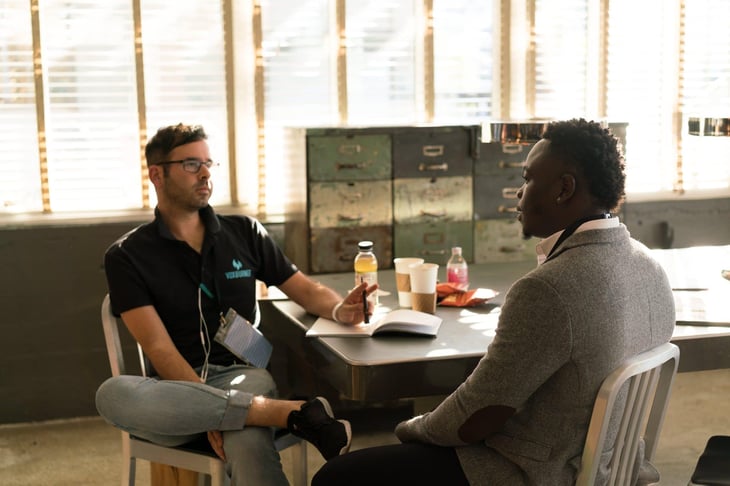8 Tips for a Great Interview

Landing an interview with a reporter can be exciting or nerve-racking, depending on your view of talking to strangers. From a PR perspective, the best interviews involve two things: key messaging and good vibes.
The reason for the first is obvious: if you’re talking with someone from the press, it’s your big chance to get your story into the world. So it’s important to have an idea of what you want to talk about and how you want to position yourself, your services, or your brand.
And while “good vibes” may sound like some real far-out hippie shit, what I mean is that you want to build a good relationship. You want mutual trust. You want the reporter to walk away thinking you’re a decent and interesting person whom they wouldn’t mind talking to again.
Here are eight tactics that will help you nail both the messaging and the tone in your next interview so you can get the kind of coverage that makes everyone on your team happy.
- Know your key messages. Simple, right? But remember: not every interview will be for a profile piece about you, your company, or your product. Many will be tangential. Knowing your key messages cold will allow you to work them in even when you’re not talking directly about your company. For example, if you’re an artisan manufacturer of handmade soup ladles, your PR firm may have gotten you an interview with someone writing about the steel tariffs and how they affect small businesses. Even if the reporter is asking about how the tariffs affect your operations, you can weave in things like “Artisan goods already cost more because they’re handmade and highly durable, so the tariffs definitely hit us hard.”
- Make today the day. Evergreen stories (ones that work equally well whenever they’re told) are your enemy. A reporter who has an evergreen story won’t feel any urgency to publish it and may walk away from it entirely. Instead, use the interview as an opportunity to make today the best possible day to tell the story you’re telling: “This is the perfect time to talk – I just spoke with a client about the rise of handmade ladles.” Or “Did you see the news about the protests these tariffs are causing?”
- Know your headline. When preparing for an interview, channel your inner sportswriter. The headline tells you all you need to know (who won / who lost). The intro paragraph sets the theme of the game (why they won or lost). The rest of the article supports the theme. And only at the very end does the story go into detail about what happened during the game (like that heartbreaking error in the third inning). Channel this by starting with the most important information, then expanding as you talk more.
- Speak in lists. Follow the classic advice for public speakers: tell them what you’re going to tell them, tell them, tell them what you told them. This makes it easy for the reporter to track what you’re saying, which gives them confidence that you’re correct because you’re so organized. That, in turn, boosts the odds that they’ll use what you said because their notes from your conversation are so clear.
- Know the reporter’s work. Read some of what the reporter has written and comment on it. (Ideally, your PR team will send you a few relevant examples when they set up the interview!) Showing familiarity with their work helps establish trust, which is the foundation for any strong relationship. For example: “It’s like what you said in that piece about homemade kitchen equipment…” or “I agree so much with what you said about soup’s imminent popularity explosion.”
- Compliment good questions. Many reporters are generalists – or they’re new to their jobs. This can make them as nervous as you are for an interview. Throwing in a “great question” here or there (without overdoing it or being inauthentic) can help them overcome any anxiety they have, making for an easier, more natural conversation. This can be especially helpful if you’re in a highly technical space.
- If you don’t know something, say so. Again, you want to establish trust. Being honest is about the only way to do that. You’ll lose credibility if you pretend to know something you don’t. Instead, be the most helpful by pointing them to a source who can help or offering to get them the information they need after the call.
- Plant the next story or reinforce what you just said. Often, at the end of an interview, a reporter will ask, “Did we cover everything?” or “Anything else you’d like to add?” Never say no to these questions! Instead, use them as an opportunity to hint at something coming up: “I think we covered all we could about the tariff changes – but we have do have something exciting next month, as we’ll be sponsoring a major soup event for STEM students.” Or, “I think we covered everything, but I just want to reiterate why our ladles are so much better at holding liquids than those now more expensive ones.”
Even “Bad” Interviews Can Be Good
This is a lot to keep in your mind as a reporter is bombarding you with questions, so don’t beat yourself up if you don’t hit all eight items every time you chat with the press. Remember: interviewing is a skill. Every time you do it, you’ll get better. And every conversation helps you build the kind of relationships that can lead to consistent, ongoing coverage for your business.







